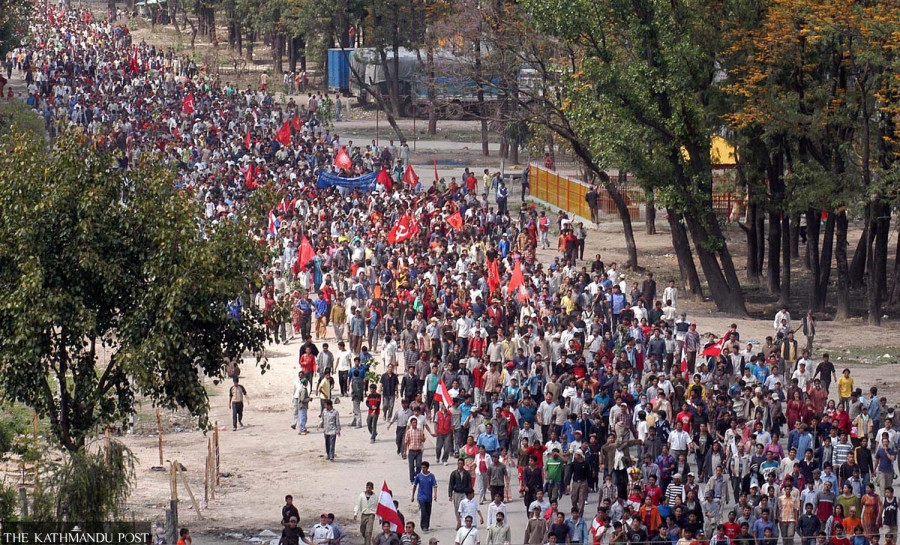National
Questions against republican system emanate from politicians’ conduct, observers say
The country looks prosperous only for politicians and their aides, a workshop owner says. ‘For common people, life is tough.’
Purushottam Poudel
As the country marks the 18th Republic Day on Thursday, experts say the nascent system couldn’t deliver as per the public expectations due to politicians’ short-sighted and self-centred politics. They, however, don’t find inherent problems in the system itself.
As the pro-republican political parties are holding various events to mark the day, the pro-monarchy forces such as the Rastriya Prajatantra Party (RPP) and other groups have planned protests demanding the restoration of monarchy and Hindu status of the country.
The RPP, the RPP-Nepal, the Joint People’s Movement Committee led by Panchayat-era leader Nabaraj Subedi and a few other royalist groups have formed a new alliance with a common objective of restoring the monarchy, which was abolished in 2008.
The monarchy was first declared abolished in May 2006 by the parliament reinstated following the success of the People’s Movement.
The Constituent Assembly elected in 2008 made a formal announcement of the abolition of monarchy and the establishment of federal republic democracy. The Assembly also elected Nepal’s first President Ram Baran Yadav, who replaced the king as the head of state.
The Constituent Assembly further institutionalised the republic by including it as a salient feature of the constitution while promulgating it in September 2015.
Experts and observers hold political parties and their leaders responsible for the under-performance of the system. When leaders who should have led by example engaged in questionable activities, people started questioning the system itself.
Hari Sharma, a political analyst, believes that the lack of societal gravitas and shallow social values have fuelled the present crisis. When the society at large moves towards a fly-by-night tendency, the leadership is supposed to correct it. But the politicians themselves face questions today, and thus the crisis has aggravated.
A mix of unaccountable political culture, aspirational social media, and impatient individuals is a challenge for the republican system, Sharma said.
Political parties and their leaders made scores of promises to the people, which did not materialise even years after the establishment of the republican system, he said. “It made people raise questions about the system itself.”
Observers, however, do not find flaws in the system.
Many experts the Post talked to had a common view. According to them, under the republican system, people saw extraordinary changes in the lives of party leaders and their hangers-on but the commoners felt no improvements in their own lives.
Analyst CK Lal blames the present situation of chaos on the political parties as they failed to take ownership of the system and strengthened it.
“Though the present republic system has become like an orphan standing alone by the road, no alternative system is out there to replace it soon,” Lal said. “The present time is like an interregnum; what will happen next is difficult to predict.”
In ancient Rome, interregnum referred to the dying old order while the new one struggled to be born.
Due to the republican parties’ failure, conservative forces have stepped up their activities aimed at restoring the monarchy.
Hari Roka, a left-leaning political analyst, believes that despite flaws in the system, monarchy is not an alternative.
Like others, Roka also blames the political parties for the present situation.
“Despite all its flaws, we also should not forget the context in which the present system was achieved,” Roka said. “And the political parties should work consciously to essentially improve the republican system. For that, delivery and good governance are the only ways.”
Abishek Thapa, 33, a permanent resident of Bharatpur, Chitwan, who owns a motorcycle workshop in Kalanki, Kathmandu, says the republic has benefitted political leaders more than the general public.
According to him, leaders claim that the country is progressing and dismiss those with critical views as negative thinkers. However, he believes the country has prospered only for politicians and their accomplices.
“For ordinary people, there is hardly an environment to earn a living,” he said. “Even when one decides to go abroad, they are forced to bribe the same leaders.”




 18.12°C Kathmandu
18.12°C Kathmandu














